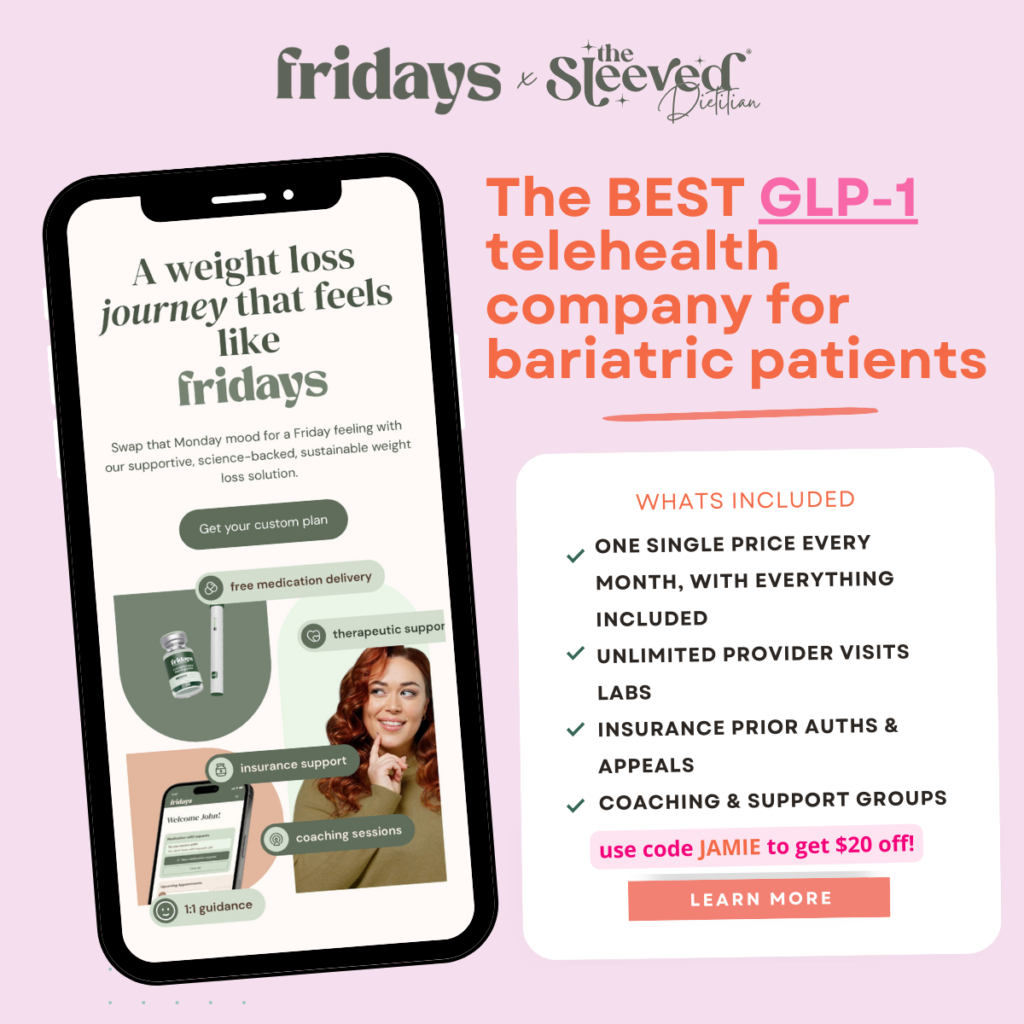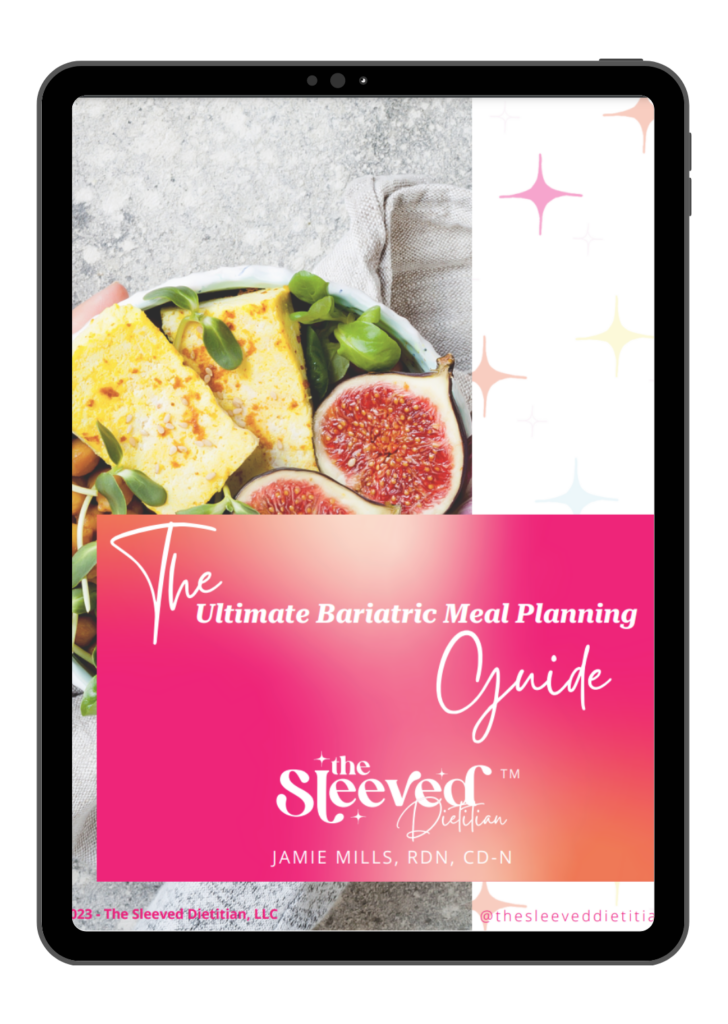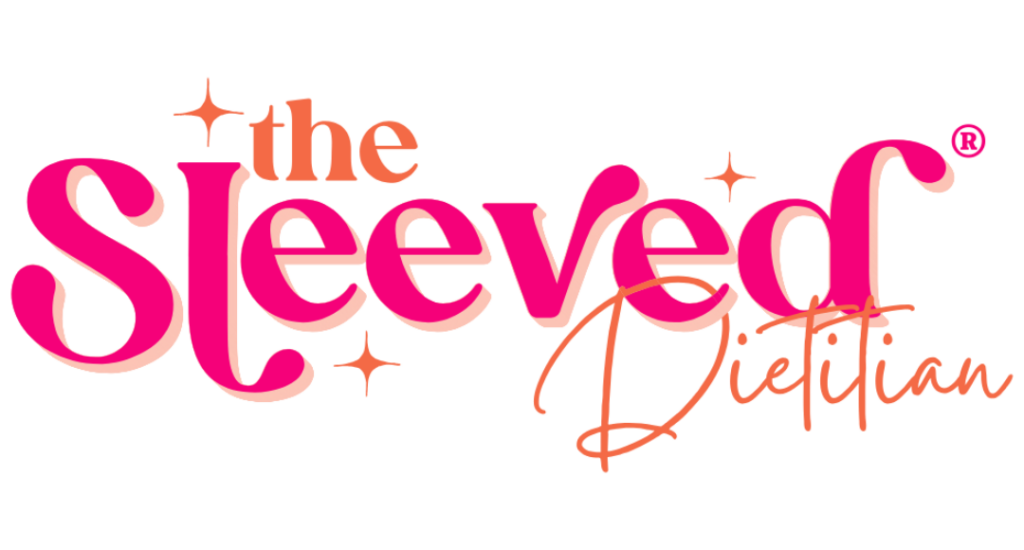If you are one of the thousands of people who have had weight loss surgery, then you know that it is a life-changing experience. It can be really difficult to adjust to your new lifestyle, and there are many things that you need to do in order to stay healthy on a daily basis.
And then – dun dun dun – new challenges emerge. How to stay focused on wellness through the holidays? Yikes!
In this blog post, we will discuss six simple tips for staying well after weight loss surgery, even through the holiday season when everything can feel different. Following these tips will help make the adjustment process easier, and will help you live a healthier life!
(Is this your first time here? Welcome! I’m Jamie, a registered dietitian AND Bariatric Patient. I lead an amazing, all inclusive virtual support program for pre-and post-WLS folks just like you. Not only does it include recipes and education materials on demand, the T.R.I.B.E also includes upwards of forty live support group sessions – we’ve got your back!)
Let’s kick off this blog post with a super quick explanation of what weight loss surgery and wellness are.

What is weight loss surgery?
There are a few different surgical procedures available to support your weight loss goals. These include Roux-en-Y gastric bypass (RNY), vertical sleeve gastrectomy (VSG), duodenal switch (DS) and laparoscopic gastric banding, to name a few.
Gastric bypass surgery is a type of weight-loss surgery (WLS). This operation on your stomach creates a small pouch. This smaller stomach size means that you will feel fuller sooner than before, thus helping you reduce your appetite.
With the vertical sleeve gastrectomy, most of your stomach is removed, leaving you with a much smaller stomach pouch. With the duodenal switch, part of your small intestine is skipped, making it so that you do not absorb all of the nutrition from your food. And in the case of the gastric banding, a silicone tube is surgically wrapped around your stomach, which allows you to feel full with less food.
No matter which kind of surgery you and your doctor choose, eating after weight loss surgery is entirely different than eating prior to weight loss surgery. If you’re someone who has used food for comfort in the past, it is even more important to have coping strategies to reduce stress because comfort eating is no longer a safe tool.
Stress management is one piece of the overall wellness puzzle. Let’s chat about what I mean by “wellness” next.
What is wellness?
Like many chronic dieters, you’ve probably thought about wellness in terms of the number on the scale or specific foods that you’re eating (vegetables!) or skipping (desserts!).
And while those are part of what wellness means, there is actually a lot more to it.
We talk a lot about the wellness wheel in my T.R.I.B.E. program; wellness includes:
- Nutritional health
- Physical health
- Emotional health
- Spiritual wellness
- Social connections
And more! There are so many factors that influence how we feel on a daily basis. I’m a dietitian, so of course what is on your plate matters, but it is also important to recognize just how many other factors play a role, too.
And this holiday season, it is also important to think ahead because there tend to be a lot more demands on your time, emotions, and your boundaries. Let’s talk about how to take care of you!
Here are my six tips for holiday wellness.
Stick to your routine
There is comfort and even magic in having a predictable, comfortable routine. This includes eating meals according to your portion and protein guidelines, the bedtime that makes you feel best, and moving your body.
While harder to do while traveling and spending time with friends and family, having a routine offers you comfort and the resilience to be able to feel good, even when you need to make different choices than you used to around the dinner table and dessert, and coffee bar.
Destress
There can be a lot of emotional baggage that erupts around the holidays. Many of us have past traumas with our families…and a lot of this trauma can be centered around weight and food.
There can be pressure to eat things that you may no longer want (or aren’t safe to eat) in portion sizes that you used to enjoy in the past. You may be spending time with people who don’t make you feel amazing or don’t have anything else to talk about besides diets or weight (we’ll talk about some conversational boundary strategies in just a sec – stay tuned).
No matter what, having a few tools to lower your stress will be welcome this holiday season. For you, this may mean having a few walks each day, finding time to write in your journal, or being able to vent on the phone with a trusted friend. No matter if it is meditation, yoga, or some blissful solitude in the woods, make sure to have a plan in place to dial back the stress-o-meter.
Protecting this time to lower stress is boundary building. Let’s talk about boundaries just a bit more because they are so. dang. important.
Build your boundaries
What are boundaries? Boundaries are your own set of guidelines of what treatment, behaviors, or even conversations you will and won’t tolerate. Basically, boundaries are a minimum standard of how you’ll be treated. Anything less than your minimum means that you’re leaving the conversation, situation, or even the relationship if needed.
Boundaries are not about controlling anyone else. You can only control yourself. How will you act, especially around the dinner table?
We tend to talk about food. A lot. Even more so around the holidays. This can be downright uncomfortable on a good day and intolerable over the holidays when tensions might already be at a level ten and you’re in a body that seems to be changing before your very eyes.
Babe: you do NOT have to talk about anything you don’t want to talk about. You don’t owe friends or family an explanation or conversation about your new way of eating, your surgery, or your body size. Period.
Setting boundaries is really hard. But it also gets easier with practice. Let’s flex those boundary muscles!
Think about what kinds of comments are sure to pop up from Aunt Brenda or Cousin Joe. And then, plan what your most empowered version of yourself would say back.
Honor your favorites
The holidays might bring about special dishes that you look forward to just once per year.
It is OK to acknowledge that it IS really hard to honor different cultural eating patterns around the holidays after surgeries. It can take practice (and probably a few mistakes) to balance those special, cultural foods and your new lifestyle.
The food that I look forward to most around the holidays is my mom’s homemade Italian anise cookies. Now that I’ve had weight loss surgery, it means that I’ve had to adapt, just like you do. What I do to enjoy this food is I make it a part of my day, not my whole day. After I’ve had a satisfying, high protein meal with my family, and it’s time to sit down to dessert, I mindfully and intentionally choose a cookie or two. I put it on a plate, savor every bite, and release any guilt or shame that might start to bubble up. Instead, I remind myself that I CHOSE to have this with intent, and I’m also CHOOSING to stop once I’m satisfying. Feeling empowered around foods that once triggered me to binge is one of the most satisfying NSV’s (non scale victories).
Remember your why
Getting weight loss surgery is a HUGE decision. You weighed through the pros and cons, spoke with doctors and dietitians, and made the best decision you could with the information that you had. It’s a big deal.
But with the pressures of the holidays, the reasons that you chose to have surgery can get muted.
As you move through the hustle and bustle of the holidays, remember what brought you to this decision, to begin with. Your WHY is great fuel to stick to your routine and enforce your boundaries.
Move your body
Exercise is important year-round, but I’ll say it is even more important around the holidays.
Moving your body just helps everything else to go more smoothly. Exercising helps you have more mood-boosting endorphins, helps you to sleep better at night and helps to dampen stress.
Keep doing the exercise that you usually love, but you can also use movement as a way to spend time with friends and family that doesn’t involve a meal. You can hike, ice-skate or just take a cool evening stroll with friends who are nearby (or as a way to get outta the house when you need a break while visiting with others).
These activities could even create new traditions that you look forward to next year!
Start a new tradition
When so many of our holiday traditions revolve around food, it can feel hard – even isolating – if you have had weight loss surgery.
I’ll encourage you to start NEW traditions that you can look forward to each year, that don’t revolve around foods. Here are a few new, non-food traditions you can try:
- Go on a hike to collect greenery and make yummy smelling wreaths and table centerpieces.
- Make pomander oranges – they’ll make your house smell so good! This is something I’ve done with my mom and sister since we were kids. We make them while we watch Christmas movies.
- Go ice-skating, rock climbing, or line dancing.
- Dry orange slices and use them to make natural ornaments (they pair well with cinnamon sticks!)
- Drive around on a clear night to see holiday lights while sipping a sugar-free, high-protein hot chocolate.
- Watch holiday movies under a cozy blanket; light candles for extra ambiance.
- Visit a model train display.
What other new holiday traditions would be fun? Comment below with your ideas!
Key takeaways
The holidays can be tricky. Not only do you need to stick to your eating routine to take care of your physical body, but you are also working to navigate the emotional challenges and stress of the holiday traditions and expectations that may no longer serve you.
Babe, you deserve to feel good about yourself. You deserve a community that gets it and the boundaries in place that protect your physical, emotional, and spiritual wellness not only during the holidays but year-round.
These holiday wellness tips might be simple to read on paper, but they take practice and persistence to put into place. If you’re ready for some support, check out the T.R.I.B.E., a community of awesome folks who have gone through WLS and are thriving. We’d love to welcome you as the newest (and dare I say, coolest?) member.









2 Responses
I love how this blog gives a voice to important social and political issues It’s important to use your platform for good, and you do that flawlessly
Thank you so much! I’m so glad you enjoyed this blog post xoxo